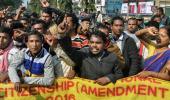'The entire brouhaha with regard to the CAB smacks of blatant Hinduphobia, a duplicitous exercise, morally corrupt in its construct and aimed at divesting deserving Hindus of basic human rights by raising the bogey of Muslim discrimination, and must be called out for what it is,' argues Vivek Gumaste.

The near-hysterical, high decibel, acerbic censure of the Citizenship Amendment Bill crowding certain sections of the Indian media is by no stretch a level-headed, rational response to the proposed legislation; it is an emotionally charged harangue, an ideologically entrenched declamation and a devious political shenanigan that appeals to contorted logic.
Moreover, this negativist campaign carries an unequivocal undertone of subtle Hinduphobia.
The Citizenship Amendment Bill amends the Citizenship Act, 1955, to make illegal migrants who are Hindus, Sikhs, Buddhists, Jains, Parsis and Christians specifically from Afghanistan, Bangladesh and Pakistan where they continue to be persecuted, eligible for citizenship.
The Bill also reduces the 12-year residence requirement to six years for persons belonging to the same six religions from the three countries.
To fully comprehend the significance of the bill, we need to revert to the horrendous vivisection of India in 1947 that saw the emergence of two nations: A secular India in keeping with pluralistic traditions of this ancient land, and a fanatic Islamic Pakistan that negated everything that India's ancient civilisation stood for.
With this division in the subcontinent, the status of its inhabitants changed abruptly and drastically. Muslims living in India were given equal status on par with the Hindu majority. Muslims on the other side of the border in Pakistan were given pride of place.
The only disadvantaged ones were the Hindus, Sikhs, Buddhists, Jains, Parsis and Christians left behind in the new Islamic Pakistan; they were literally reduced to second class citizens for no fault of theirs. Families who had lived for centuries in the same place were disenfranchised by a single stroke of a pen
The modern Indian nation as the successor State of an ancient civilisation had a bounden duty towards this subset of the population which it abrogated by callously abandoning over five million Hindus, Sikhs and Christians and Buddhists to the vagaries of an oppressive religious State. It was an inexcusable moral lapse and a stark dereliction of duty.
This Bill corrects that historical blunder -- plain and simple, nothing more, nothing less.
Challenging the centrality of Partition, Tavleen Singh, writing in the Indian Express flippantly retorts: 'With the deepest respect, Ram Madhavji, I would like to say that this is rubbish and you probably know this. Partition has nothing to do with this law. As someone who belongs to a family of refugees from Pakistan, may I tell you that the 'fallout' of Partition was dealt with long ago.'
Wrong, Ms Singh, this Bill has everything to do with Partition. In fact, your very statement underscores my argument. As a 'family of refugees from Pakistan', you were given equal rights in this country to work and flourish and your status today is testimony to that.
But the unfortunate hapless Hindus and other minorities left back in Pakistan were never treated equally; they were reduced to second class citizens, subjects of a relentless dehumanising religious apartheid.
It is ironical that you, coming from a family of ex-refugees should be in the forefront of this dark campaign to deprive this deserving population of much needed succor.
Also, the 'fallout' of Partition was not dealt with long ago and nor did it end for some. The minorities in Pakistan relive the consequences even today. Forced conversions, forced abduction of young girls to be married off to Muslims and mindless destruction of their temples is an inevitable part of their daily routine.
According to Global Human Rights Defence and the Movement for Solidarity and Peace, an estimated 1,000 Hindu and Christian girls are kidnapped and forced to convert to Islam annually.
The Human Rights Commission of Pakistan indicates that as many as 20 to 25 girls from the Hindu community in Pakistan are abducted every month and converted forcibly to Islam.
The Pakistani State has even usurped the religious properties of Hindus and Sikhs, leaving them with no place to cremate their dead forcing them to bury their dead -- the ultimate ignominy.
The continued atrocities against Hindus and other minorities in post-Partition Pakistan and subsequently Bangladesh makes this Bill all the more compelling.
Even after crossing over to India, these refugees continue to suffer, though to a lesser degree. Thousands of Hindu refugees exist in a state of limbo in hundreds of squalid settlements spread out across Rajasthan and other parts of the country. Some have even been forced to return to Pakistan and definite conversion to Islam to escape the uncertainty. Their plight is pathetic as this excerpt from this Rediff report on Hindu refugees indicates:
It is high time the Government of India woke up to the plight of these Hindu migrants and other minorities and treated them with compassion and gave them the rights they deserve.
The Bill does not come a day sooner.
The provocative charge that this Bill violates the concept of equality enshrined in our Constitution and is discriminatory in nature vis-a-vis Muslims stems from a simplistic and ignorant interpretation of the law.
True, Article 14 of the Constitution of India states that: 'The State shall not deny to any person equality before the law or the equal protection of the laws within the territory of India' and Article 15 disbars discrimination on the grounds of religion, race, caste, sex or place of birth or any of them.
However, over the years, the Supreme Court in its judgments has refined the definition of equality. It permits laws to differentiate between groups of people if the rationale for doing so serves a reasonable purpose.
In its judgment in the Onkar Lal Bajaj vs the Union of India case, the Supreme Court categorically stated (external link) that 'equal treatment of unequals is nothing but inequality'.
Accordingly, to treat a Hindu or Sikh fleeing persecution and certain death in Pakistan, Bangladesh or Afghanistan on par with a Muslim voluntarily sneaking into India for economic reasons or otherwise is callously cruel, grossly unjust and ethically flawed -- in short, an undiluted perversion.
To deprive Hindus fleeing persecution from sanctuary in the only country in the world that they can call home is evil incarnate. Even at the cost of appearing farcical, I must remark that for some Indians the degree of Hindu discomfiture is a gauge of secularism; the greater the imposition on Hindus, the more secular we are supposed to be.
This Bill rightfully and appropriately excludes Muslims from the Muslim majority countries of Pakistan, Bangladesh and Afghanistan. The notion of Muslims fleeing Muslim majority countries because of religious persecution is oxymoronic; a ridiculous proposition that makes mockery of common sense.
Interjecting the problem of Ahmadiyyas in Pakistan into the discourse is a deliberate distraction of nuisance value to show up the CAB as unfair but lacks real substance.
Objectively speaking, Ahmadiyyas would prefer safer havens than India where our dysfunctional secularism has turned a blind eye to their systematic harassment by other Muslims.
Ahmadiyyas are not even allowed to sit on the board of the All India Muslim Personal Law Board!
Our liberals who are today concerned about Ahmadiyyas in Pakistan have strangely remained mute to the plight of Indian Ahmadiyyas all these years, thus unravelling their Janus face.
Next, can somebody please explain to me how this bill discriminates against Indian Muslims lawfully residing in India? The truth is, it does not. I reiterate: This Bill is applicable to illegal migrants only and in no way diminishes the status of Indian Muslims. So, let us not see demons where none exist.
Every self-respecting nation has a mechanism in place to validate citizenship and safeguard its sovereignty; for India, the National Registry of Citizens serves this purpose and acts as a deterrent to future illegal migrants.
One of the defects of the NRC was that it failed to make a distinction between refugees and voluntary illegal migrants. The CAB corrects this deficiency.
To view the CAB and NRC through the jaundiced lens of communalism is a dangerous self-serving tendency that does no one any good, especially Muslims; it only promotes social distrust and social disharmony by feeding into the insecurity of Muslims.
Moreover, it demeans Indian Muslims by clubbing them with illegal aliens.
Critics and political parties need to exhibit due caution and foresight.
The entire brouhaha with regard to the CAB smacks of blatant Hinduphobia, a duplicitous exercise, morally corrupt in its construct and aimed at divesting deserving Hindus of basic human rights by raising the bogey of Muslim discrimination.
It must be called out for what it is.
The Citizenship Amendment Bill is a moral intervention in keeping with our tradition and the fundamentals of our Constitution. It does not discriminate against upright Muslim citizens of India.
To negate the CAB would be an unpardonable moral lapse, a crime against humanity in general and Hindus in particular.
US-based academic and political commentator Vivek Gumaste is the author of My India: Musings of a Patriot. He can be contacted at news@rediff.co.in











 © 2025
© 2025